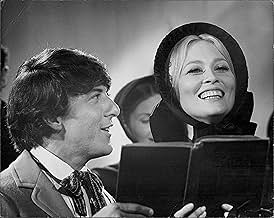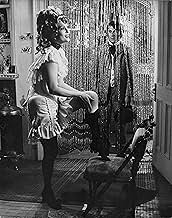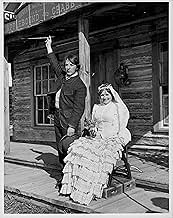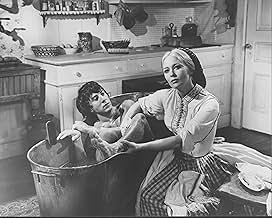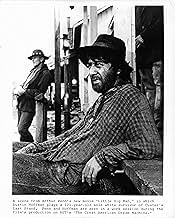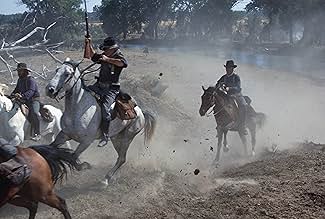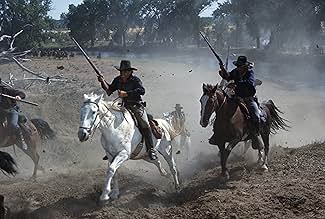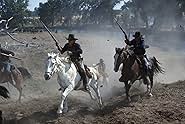Little Big Man
- 1970
- Tous publics
- 2h 19m
Jack Crabb, looking back from extreme old age, tells of his life being raised by Native Americans and fighting with General Custer.Jack Crabb, looking back from extreme old age, tells of his life being raised by Native Americans and fighting with General Custer.Jack Crabb, looking back from extreme old age, tells of his life being raised by Native Americans and fighting with General Custer.
- Director
- Writers
- Stars
- Nominated for 1 Oscar
- 5 wins & 11 nominations total
- Sunshine
- (as Amy Eccles)
- Caroline
- (as Carol Androsky)
- Lieutenant
- (as Jess Vint)
- Director
- Writers
- All cast & crew
- Production, box office & more at IMDbPro
Featured reviews
Critique: Extremely enjoyable, epic western directed by Arthur Penn. Praised for its depiction of Native Americans, it has biting satirical (and political) touches, saddled with farcical historical accounts of the Indian Wars. The once controversial aspects were meant to represent the ideologies of the time, but it has not lost any of its grit.
What I like the most is its unique interpretation of Indians. Never in the long cycles of American westerns were Indians presented as almost alien, coming across as a mythical people whose ignorance of political maneuvers and technology proved their downfall. A very bitter and sad farewell swansong to what war and genocide has taken away.
Atypical cast delivers strong passages but you won't forget the 2-standout roles of General Custer as portrayed by the maniacal Richard Mulligan and 'Old Lodge Skies' played by the philosophical Chief Dan George.
QUOTES: Old Lodge Skies: "There is an endless supply of white men. But there has always been a limited number of 'human beings'. We won today, we won't win tomorrow."
It's an epic, tragic tale - but one told with an often very funny voice. Part satire, part honest look at America's dark and untold history, the tone and narrative structure of this film were ground-breaking. And it still looks fresh: the script, the acting, the camera, the music: everything still oozes quality more than 40 years later. A timeless classic. 9 stars out of 10.
Favorite Films: http://www.imdb.com/list/ls054200841/
Lesser-known Masterpieces: http://www.imdb.com/list/ls070242495/
Favorite Low-Budget and B-movies: http://www.imdb.com/list/ls054808375/
Favorite TV-Shows reviewed: http://www.imdb.com/list/ls075552387/
Most of Penn's movies are double-edged swords presenting serious subjects with a twinkle in the eye--`The Miracle Worker' seems to be an exception to the rule. Penn seem to have a strange knack of picking subjects that seem to be governed by forces greater than themselves-leading to alienated situations. My favorite Penn film is the 1975 film `Night Moves' which ends with the boat going round in circles in the sea.
This work of Penn and novelist Thomas Berger follows the same pattern. The main character Crabb is buffeted between the Red Indians and the whites by forces beyond his control. Only once is he able to control his destiny--to lead Custer to his doom, because Custer in his impetuosity has decided to act contrary to any advice from Crabb. The religious and social values of both seem vacuous. The priest's wife may seem religious but is not. The adopted grandfather cannot die on the hilltop but has to carry on living. The gunslinger is a cartoon. Historical heroes like Wild Bill Hickok are demystified into individuals with down-to-earth worries.
It is surprising to me that many viewers have taken the facts of the film and novel as accurate--when it is obviously a work of fiction based on history. The charm of the film is the point of view taken by the author and director. The comic strain begins from the time Jim Crabb's sister is not raped by the Indians right up to the comic last stand of Custer. The film is hilarious as it presents a quirky look at every conceivable notion presented by Hollywood cinema: the brilliant acumen of army Generals, the Red Indian satisfying several squaws, the priest's wife turned prostitute who likes to have sex twice a week but not on all days, the quack who has turned to selling buffalo hides as he sees it as a better profession even if he has lost several limbs, etc.
The film is a tragedy--a tragic presentation of the Red Indian communities decimated by a more powerful enemy, tragic soldiers led by megalomaniac Generals, heroes reduced to fallible individuals, all heroes (including the Red Indians) whittled down to dwarfs.
The film is a satire of a dwarf who claims to have achieved a great revenge on Custer, a dwarf who could not assassinate Custer, the dwarf in many of us. It is a great film, but often misunderstood. Penn is a great director, whose greatness cannot be evaluated by this one film but by the entire body of his films. What he achieved in this film outclasses films like Tonka (1958) and Soldier Blue (1970), two notable films on similar themes. Chief Dan George, Dustin Hoffman, and cinematographer Harry Stradling Jr have considerably contributed to this fine cinematic achievement, but ultimate giant behind the film is Arthur Penn.
He has presented yet another example of looking at a subject and seeing two sides of the coin that appear as contradictions but together enhances our entertainment.
The book is more human, giving each character Jack encounters three dimensions and avoiding the trap of rendering any of them either all good or all bad. The moment in Penn's film that best evoke the book is the scene where Custer catches Jack approaching to kill him and instead of killing his stalker, lets him go. Throughout this wonderful novel, characters do unexpected things that seem at first to be totally out of character, and thus serve to remind us of the complexity of human beings. As someone suggests here, the film may intend to say something about the random, unpredictable nature of the universe. The novel does something a lot more difficult and down-to-earth: It reminds us that it takes a lifetime to know even a few of our fellow humans. And especially for Jack, who has to navigate two distinct cultures.
So if you liked the movie, by all means read the book. You'll finish it loving this tall tale way more.
Did you know
- TriviaThe role of Old Lodge Skins was initially offered to Marlon Brando, who turned it down. Other sources claim Arthur Penn's first choice for the role was Sir Laurence Olivier. When that didn't work out, Richard Boone was slated for the role. When Boone backed out at the last minute, Chief Dan George was given the part and earned an Oscar nomination.
- GoofsThe wires forcing a horse to fall are visible in the final battle scene, just before Custer exclaims "Fools! They're shooting their own horses!"
- Quotes
Jack Crabb: Do you hate them? Do you hate the White man now?
Old Lodge Skins: Do you see this fine thing? Do you admire the humanity of it? Because the human beings, my son, they believe everything is alive. Not only man and animals. But also water, earth, stone. And also the things from them... like that hair. The man from whom this hair came, he's bald on the other side, because I now own his scalp! That is the way things are. But the white man, they believe EVERYTHING is dead. Stone, earth, animals. And people! Even their own people! If things keep trying to live, white man will rub them out. That is the difference.
- ConnectionsFeatured in Arthur Penn: The Director (1970)
- SoundtracksBringing In the Sheaves
(1880) (uncredited)
Music by George A. Minor (1880)
Hymn by Knowles Shaw (1874)
Sung a cappella by Faye Dunaway
- How long is Little Big Man?Powered by Alexa
Details
- Release date
- Country of origin
- Language
- Also known as
- Les extravagantes aventures d'un visage pâle
- Filming locations
- Production companies
- See more company credits at IMDbPro
Box office
- Budget
- $7,000,000 (estimated)
- Gross US & Canada
- $31,559,552
- Gross worldwide
- $31,559,552

